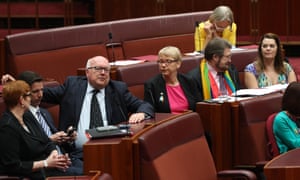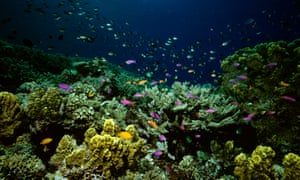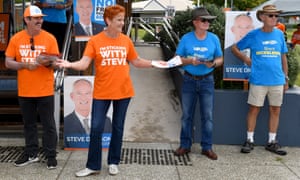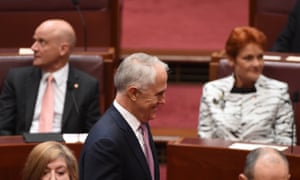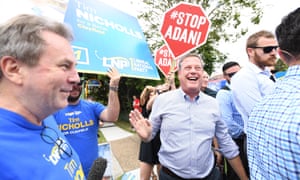Australia’s financial regulator has stepped-up its warning to banks,
lenders and insurers, saying climate change is already impacting the
global economy, and flagged the possibility of “regulatory action”.
Geoff Summerhayes from the Australian Prudential Regulation Authority (Apra) revealed it had begun quizzing companies about their actions to assess climate risks, noting it would be demanding more in the future.
Apra also revealed it has established an internal working group to assess the financial risk from climate change and was coordinating an interagency initiative with the corporate watchdog Asic, the Reserve Bank of Australia (RBA) and federal Treasury to examine what risks climate change was posing to Australia’s economy.
In February, Summerhayes put banks, lenders and insurance companies on notice, urging them to start adapting to climate change and warning that the regulator would be “on the front foot on climate risk”.
Now, in the first significant update to Apra’s thinking on the topic since that speech, Summerhayes said Apra’s view was that climate change and society’s response to it “are starting to affect the global economy”.
In an extended version of a speech to the progressive Centre for
Policy Development, and circulated to journalists ahead of its delivery,
Summerhayes said a shift occurring in the global economy was
increasingly being driven by commercial imperatives – investments,
innovation and reputational factors – rather than what scientists or
policymakers are saying or doing.
“Apra is not a scientific body and I can’t say with 100% conviction to what extent scientists’ predictions of increasing temperatures, rising sea levels, more frequent droughts and more intense storms will impact the Australian economy,” Summerhayes said.
“But what I can tell you with absolute certainty is that the transition to a low-carbon economy is underway and moving quickly.”
Summerhayes reported that a Sustainable Insurance Forum meeting in December was told that “that keeping the planet on track to meet the Paris agreement’s two-degree target could reduce fossil fuel revenues globally by a cumulative $33 trillion by 2040”.
“So while the debate continues about the physical risks, the transition to a low-carbon economy is underway and that means the so-called transition risks are unavoidable,” Summerhayes said.
He noted that Apra would be conducting a survey of entities it regulated over the next few months, to find out what the emerging best practice was, and that there is a global trend towards a requirement for companies to disclose climate-related risks.
Summerhayes said Apra had already begun scrutinising the financial sector in this regard and had begun coordinating with other agencies.
He said the regulator had already been asking questions of companies about what they have done in relation to his comments in February and said over time they will expect “more sophisticated answers, especially from well-resourced and complex entities”.
He said the inter-agency initiative created between Apra, Asic, the RBA and Treasury would investigate whether companies are taking steps to protect themselves and their customers from the physical, transitional and liability risks caused by climate change.
The involvement of Asic in the initiative is interesting following advice from Noel Hutley SC last year finding company directors who do not properly consider the material impacts of climate change on their business risk personal liability for breach of duty.
“So whether due to regulatory action or – more likely – pressure from investors and consumers, Australia’s financial sector can expect to see more emphasis on discourse around climate risk exposure and management,” Summerhayes said.
Geoff Summerhayes from the Australian Prudential Regulation Authority (Apra) revealed it had begun quizzing companies about their actions to assess climate risks, noting it would be demanding more in the future.
Apra also revealed it has established an internal working group to assess the financial risk from climate change and was coordinating an interagency initiative with the corporate watchdog Asic, the Reserve Bank of Australia (RBA) and federal Treasury to examine what risks climate change was posing to Australia’s economy.
In February, Summerhayes put banks, lenders and insurance companies on notice, urging them to start adapting to climate change and warning that the regulator would be “on the front foot on climate risk”.
Now, in the first significant update to Apra’s thinking on the topic since that speech, Summerhayes said Apra’s view was that climate change and society’s response to it “are starting to affect the global economy”.
“Apra is not a scientific body and I can’t say with 100% conviction to what extent scientists’ predictions of increasing temperatures, rising sea levels, more frequent droughts and more intense storms will impact the Australian economy,” Summerhayes said.
“But what I can tell you with absolute certainty is that the transition to a low-carbon economy is underway and moving quickly.”
Summerhayes reported that a Sustainable Insurance Forum meeting in December was told that “that keeping the planet on track to meet the Paris agreement’s two-degree target could reduce fossil fuel revenues globally by a cumulative $33 trillion by 2040”.
“So while the debate continues about the physical risks, the transition to a low-carbon economy is underway and that means the so-called transition risks are unavoidable,” Summerhayes said.
He noted that Apra would be conducting a survey of entities it regulated over the next few months, to find out what the emerging best practice was, and that there is a global trend towards a requirement for companies to disclose climate-related risks.
Summerhayes said Apra had already begun scrutinising the financial sector in this regard and had begun coordinating with other agencies.
He said the regulator had already been asking questions of companies about what they have done in relation to his comments in February and said over time they will expect “more sophisticated answers, especially from well-resourced and complex entities”.
He said the inter-agency initiative created between Apra, Asic, the RBA and Treasury would investigate whether companies are taking steps to protect themselves and their customers from the physical, transitional and liability risks caused by climate change.
The involvement of Asic in the initiative is interesting following advice from Noel Hutley SC last year finding company directors who do not properly consider the material impacts of climate change on their business risk personal liability for breach of duty.
“So whether due to regulatory action or – more likely – pressure from investors and consumers, Australia’s financial sector can expect to see more emphasis on discourse around climate risk exposure and management,” Summerhayes said.

